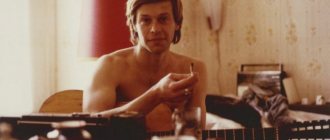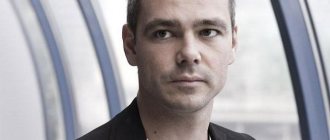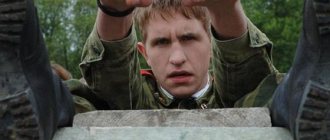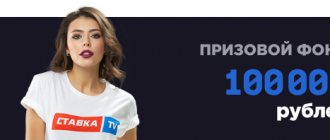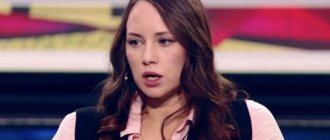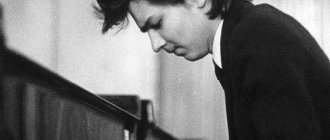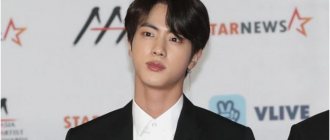Childhood and youth
Vladimir Kott is a Muscovite. He was born on February 22, 1973. His brother’s creative hobbies played a major role in the boy’s biography. Feeling support and seeing before him an example of how ambitious goals are achieved, Vladimir was not inferior to Alexander. In 1996 he graduated from RATI-GITIS. The director studied on the course of Boris Golubovsky. After receiving his diploma, he, like most of his newly minted colleagues, went to a provincial town to gain real experience.
Vladimir worked at the Youth Theater in Tver and staged plays in Kaluga at the Drama Theater named after. Dostoevsky. In 1999, he received an invitation from his brother to act as a second director on the set of the film “Two Chauffeurs Driving.” The film was released in theaters in 2001 and told about the events taking place in 1945. The film won the nomination “For Best Director” at the Kinoshock festival.
A large and successful creative project helped Vladimir more clearly assess his potential and think about his prospects. The young man decided to learn screenwriting. He became a student in Vladimir Khotinenko's workshop at the Higher Courses for Scriptwriters and Directors.
An excerpt characterizing Kott, Vladimir Konstantinovich
- Enter Russia without declaring war. “I will make peace only when not a single armed enemy remains on my land,” he said. It seemed to Boris that the sovereign was pleased to express these words: he was pleased with the form of expression of his thoughts, but was dissatisfied with the fact that Boris heard them. - So that no one knows anything! – the sovereign added, frowning. Boris realized that this applied to him, and, closing his eyes, bowed his head slightly. The Emperor again entered the hall and remained at the ball for about half an hour. Boris was the first to learn the news about the crossing of the Neman by French troops and thanks to this he had the opportunity to show some important persons that he knew many things hidden from others, and through this he had the opportunity to rise higher in the opinion of these persons. The unexpected news about the French crossing the Neman was especially unexpected after a month of unfulfilled anticipation, and at a ball! The Emperor, at the first minute of receiving the news, under the influence of indignation and insult, found what later became famous, a saying that he himself liked and fully expressed his feelings. Returning home from the ball, the sovereign at two o'clock in the morning sent for secretary Shishkov and ordered to write an order to the troops and a rescript to Field Marshal Prince Saltykov, in which he certainly demanded that the words be placed that he would not make peace until at least one the armed Frenchman will remain on Russian soil. The next day the following letter was written to Napoleon. “Monsieur mon frere. J'ai appris hier que malgre la loyaute avec laquelle j'ai maintenu mes engagements envers Votre Majeste, ses troupes ont franchis les frontieres de la Russie, et je recois a l'instant de Petersbourg une note par laquelle le comte Lauriston, pour cause de cette aggression, annonce que Votre Majeste s'est consideree comme en etat de guerre avec moi des le moment ou le prince Kourakine a fait la demande de ses passeports. Les motifs sur lesquels le duc de Bassano fondait son refus de les lui delivrer, n'auraient jamais pu me faire supposer que cette demarche servirait jamais de pretexte a l'agression. En effet cet ambassadeur n'y a jamais ete autorise comme il l'a declare lui meme, et aussitot que j'en fus informe, je lui ai fait connaitre combien je le desapprouvais en lui donnant l'ordre de rester a son poste. Si Votre Majeste n'est pas intentionnee de verser le sang de nos peuples pour un malentendu de ce genre et qu'elle consente a retirer ses troupes du territoire russe, je regarderai ce qui s'est passe comme non avenu, et un accommodement entre nous sera possible. Dans le cas contraire, Votre Majeste, je me verrai force de repousser une attaque que rien n'a provoquee de ma part. Il depend encore de Votre Majeste d'eviter a l'humanite les calamites d'une nouvelle guerre. Je suis, etc. (signe) Alexandre.” [“My lord brother! Yesterday it dawned on me that, despite the straightforwardness with which I observed my obligations towards Your Imperial Majesty, your troops crossed the Russian borders, and only now have I received a note from St. Petersburg, with which Count Lauriston informs me regarding this invasion, that Your Majesty considers yourself to be on hostile terms with me from the time Prince Kurakin demanded his passports. The reasons on which the Duke of Bassano based his refusal to issue these passports could never have led me to suppose that the act of my ambassador served as a reason for the attack. And in fact, he did not have a command from me to do this, as he himself announced; and as soon as I learned about this, I immediately expressed my displeasure to Prince Kurakin, ordering him to carry out the duties entrusted to him as before. If Your Majesty is not inclined to shed the blood of our subjects because of such a misunderstanding and if you agree to withdraw your troops from Russian possessions, then I will ignore everything that happened, and an agreement between us will be possible. Otherwise, I will be forced to repel an attack that was not provoked by anything on my part. Your Majesty, you still have the opportunity to save humanity from the scourge of a new war. (signed) Alexander.” ] On June 13, at two o'clock in the morning, the sovereign, calling Balashev to him and reading him his letter to Napoleon, ordered him to take this letter and personally hand it over to the French emperor. Sending Balashev away, the sovereign again repeated to him the words that he would not make peace until at least one armed enemy remained on Russian soil, and ordered that these words be conveyed to Napoleon without fail. The Emperor did not write these words in the letter, because he felt with his tact that these words were inconvenient to convey at the moment when the last attempt at reconciliation was being made; but he certainly ordered Balashev to hand them over to Napoleon personally. Having left on the night of June 13th to 14th, Balashev, accompanied by a trumpeter and two Cossacks, arrived at dawn in the village of Rykonty, at the French outposts on this side of the Neman. He was stopped by French cavalry sentries. A French hussar non-commissioned officer, in a crimson uniform and a shaggy hat, shouted at Balashev as he approached, ordering him to stop. Balashev did not stop immediately, but continued to walk along the road. The non-commissioned officer, frowning and muttering some kind of curse, advanced with the chest of his horse towards Balashev, took up his saber and rudely shouted at the Russian general, asking him: is he deaf, that he does not hear what is being said to him. Balashev identified himself. The non-commissioned officer sent the soldier to the officer. Not paying attention to Balashev, the non-commissioned officer began to talk with his comrades about his regimental business and did not look at the Russian general. It was unusually strange for Balashev, after being close to the highest power and might, after a conversation three hours ago with the sovereign and generally accustomed to honors from his service, to see here, on Russian soil, this hostile and, most importantly, disrespectful attitude towards himself of brute force. The sun was just beginning to rise from behind the clouds; the air was fresh and dewy. On the way, the herd was driven out of the village. In the fields, one by one, like bubbles in water, the larks burst into life with a hooting sound.
Movies
The director’s independent film debut was the short film “The Door”. The film was a thesis work and was published in 2004. The parable about the hero who carried everywhere the door of an old destroyed house told how a person often drags the burden of the past with him, unable to get rid of it. The film received awards from the Student Film Festival in Germany and the Brussels Fantastic Film Festival. In Russia her Fr. Awards were also presented to Cotte in France, Syria and Italy.
Vladimir decided to try his hand at television. The author’s first major project was the 8-episode film “Kinship Exchange.” The images of the main characters in the frame were embodied by Dmitry Pevtsov and Marat Basharov, Mikhail Porechenkov and Kristina Orbakaite. Working with famous artists turned out to be a great challenge for the director, but the mini-series was a success with the audience.
In 2006, the adventure-fantasy film “Hunter” was released. The plot told the story of the medieval breadwinner Vladimir, who found himself in modern Moscow realities. All collisions and twists and turns were built around one nuance: the pagan gods sent the hero to help the woman.
View this post on Instagram
A post shared by Anna Tsukanova-Kott ? (@anna_tsukanova_kott) on May 7, 2020 at 8:54am PDT
Vladimir Kott (left) and brother Alexander Kott with his wife Anna Tsukanova-Kott
In 2008, the director’s filmography was supplemented by a large-format project called “The Fly.” The film became a laureate of several international festivals and received the Gold Cup in Shanghai. The story of truck driver Mukhin, whose life changed after receiving a letter from his ex-girlfriend, was awarded with an award in the Czech Republic. It became the best film at the Children's Film Festival.
The film “Gromozeka”, released in 2011, was filmed based on the author’s script by Vladimir Kott. The film was included in the competition program of the international festival in Rotterdam. According to the author, the genre of the film is defined as a black comedy. This work was also awarded by experts at international film awards.
Russian and international filmmakers also praised the director’s subsequent works. Among them are the films “Peter Leshchenko. Everything that happened”, “At the bottom”, “Frozen carp”. The latter starred Marina Neyolova, Alisa Freindlikh and Evgeny Mironov. The creator of original projects, Vladimir Kott, was lucky to work on the site with famous artists, masters of the modern stage.
In 2018, Kott received an invitation to take the post of mentor at the VGIK director’s workshop. Now he teaches students.
Notes
- Irina Pushkareva.
[https://www.tvindie.ru/content/file/file1202804215.pdf The look of a fatalist (interview with V. Kott)].
CinePhantom Week
(February 11-17, 2008). Retrieved August 2, 2011. [https://www.webcitation.org/69aSFD61s Archived from the original on August 1, 2012]. - ↑ 1 2 Sergey Gavrilov.
[https://www.euxpress.de/archive/artikel_1486.html “Door” to success].
Europe-Express
(May 15, 2006). Retrieved August 2, 2011. [https://www.webcitation.org/69aSMdN5m Archived from the original on August 1, 2012]. - Susanna Alperina.
[https://www.rg.ru/2011/02/04/kott-poln.html Year of Kott: A film by Russian director Gromozek represents Russia at the Rotterdam Film Festival].
Russian newspaper
(February 4, 2011). Retrieved August 2, 2011. - [https://kinosoyuz.com/news/?pub=2285 We are with you!]. kinosoyuz.com (March 8, 2014).
Filmography[ | ]
Director[ | ]
- 2004 — “The Door” (short film)
- 2005 — “Kinship Exchange”
- 2006 — “Hunter”
- 2007 — “Kings of the Game”
- 2008 — “Fly”
- 2008 - “May 9. Personal attitude" (short story "Inscription")
- 2008 — “Oranienbaum. Silver Samurai"
- 2010 — “Moscow. Central District 3"
- 2011 — “Gromozeka”
- 2011 — “Operation Gorgon”
- 2012 — “At Risk”
- 2012 - “Nowhere to rush” (short story “Für Eliza”)
- 2013 - “Peter Leshchenko. All that has gone before…"
- 2014 - “At the Bottom”
- 2017 — “Frost-bitten carp”[5]
- 2018 — “The Day Before”
- 2018 — “Intercessors”
- 2019 — “Oath”
- 2019 — “Through the eyes of children”
- 2019 — “Without Memory”
- 2019 — “Coal”
- 2019 — “Ideal Family”
Screenwriter[ | ]
- 2004 — “The Door” (short film)
- 2008 — “Fly”
- 2008 - “May 9. Personal attitude" (short story "Inscription")
- 2011 — “Gromozeka”
- 2011 — “Operation Gorgon”
- 2012 - “Nowhere to rush” (short story “Für Eliza”)
- 2014 - “At the Bottom”
Producer[ | ]
- 2017 — “Pagans”
Editor[ | ]
- 2017 — “Frost-bitten carp”




